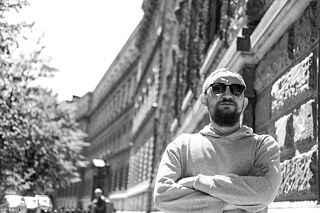Since they first met in 2015, Ulrike Almut Sandig and Ukrainian poet and musician Grigory Semenchuk have formed a close artistic bond. So what happens to a poem when it gets translated into another language – and turned into a film? Our columnist shows us – and explains why it stars a rabbit.
Back in 2015, shortly before going to the Leipzig Book Fair, I was contacted by a staffer from the Goethe-Institut Ukraine. We met up at Café Telegraph, where she slid a bar of Roshen chocolate across the table to me and told me about her native country (which was still governed at the time by an industrial magnate who happens to own this chocolate brand) in such a captivating way that I felt like going over there straightaway to discover it for myself. So when spring came, I flew to Kyiv.Concert readings with Grigory Semenchuk
I was asked to improvise a “concert reading” with a performance poet – who also makes electronic music – at a book fair that has been held at Mystetskyi Arsenal, on the grounds of Kyiv’s former citadel, since 2011. We didn’t actually meet till just before the sound check. Grigory Semenchuk, born in 1991, wearing sunglasses, and I, a dozen years older, freezing under my thin apparel, hit it off straightaway. And an hour later, there we were in the Arsenal courtyard giving a concert that people who were there still sometimes ask me about.
Grigory Semenchuk | Foto: Anastasia Ivanova
Grigory Semenchuk is a poet and musician based in Lviv, where he’s also involved in helping the homeless and curating the Authors’ Reading Month festival, an annual literary festival held simultaneously in various Central European cities in July. Grigory’s coming-of-age as a poet coincided with the 2013/2014 Maidan Revolution and the covert invasion of Ukraine by Russian troops – a collective trauma for his generation that infused his early poems.
No way she’ll get through, oh dear, – Hemmed in by ice and snow, I fear
One such poem is on our debut album, which we recorded a few months after our first appearance together in Kyiv. It pictures Vesna, the personification of spring, driving up to the forest in a fancy black Lexus. But the winter woods, covered in deep snow, are indomitable, as if cursed by the Russian Father Frost:In her hot black crossover car,
With its universal bodywork and five-litre engine inside,
With wild animals on the bonnet and in the boot,
The Spring Woman bursts out of the woods.
The moon flashes on the windows, to a soundtrack of ghosts.
[...]
Whilst producing our first video in Berlin in 2016, I had a brainwave: to translate the “Spring Woman” as a rabbit scampering through the forest by the Wannsee lakeshore on a winter’s night, searching for someone it can’t find. This is how we translate poems into other languages – as well as into other media. I think the film version, in particular, makes this poem as universal as poetry itself is, in essence. The video has taken on a new meaning to me since the Russian invasion of Ukraine in 2022. Impossible as it sometimes was for Grigory to enter the EU during the pandemic, now – as in the film – we meet up almost exclusively online. All the same, we manage to write “poetry songs” and shoot new videos with Sascha, to which Grigory contributes via green screen from Lviv. We perform together, too, when possible. And I compose the German renderings of his poems.
How not to lose your mind
In a new poem of his, someone again turns back after having a look around a city coated in black ice. But this time around, it’s God himself who turn back. So the poem takes his place and undertakes the arduous task of giving solace and strength.The alarm shrills through the church portal
as though God had suddenly
made his entrance
the city is glazed in frost
the stained-glass windows of the house of prayer
sparkling in the dark
I wonder whether he really
made it here on this street,
rutted by mechanical diggers,
whether he lit up dark February,
spreading his eternal light upon us
from the heavens above,
explained to us what would happen next
where we’d find strength
how not to lose our minds
whether he’d calm down the simple
explain to the wise
not touch the average
the alarm died down again
maybe it was all
a false alarm
he came or didn’t come
he looked around and realized
it wasn’t the right time
An SMS pops up on my phone whilst writing this column. “Hi dear, I am in Chemnitz!” Grigory is coming over the day after tomorrow, and we’ll be eating, drinking and making plans. The war won’t stop us from recording a new album.
Word! The Language Column
Our column “Word!” appears every two weeks. It is dedicated to language – as a cultural and social phenomenon. How does language develop, what attitude do authors have towards “their” language, how does language shape a society? – Changing columnists – people with a professional or other connection to language – follow their personal topics for six consecutive issues.
April 2024
